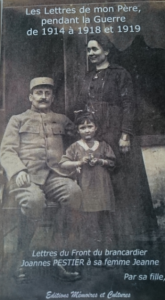Each month, a postgraduate student or an early career researcher shares their experiences of using a particular archive. The overall aim of this section is to create a database of the different archives available to those working on French and Francophone studies that will be of help particularly to students just starting out in research.
Laura Boyd is a PhD Student at the University of Leeds working on representations of enlisted non-combatants in the British and French Armies during the Great War. Here she talks about using First World War Archives at the BNF.

This post brings together two trips that I undertook to the BNF in Paris; the first during my MA and the second in the first year of my PhD. It is important make sure you have all of the paperwork that you need before you get there http://www.bnf.fr/en/bnf/admission_and_rates/a.admission_to_reading_rooms_research_library.html. They may also interview you, but it is very brief and they tend to be friendly about it. I stayed in the 11eme arrondissement, around 30 minutes away from the BNF on the metro, with one change at Nation.
Each of the trips lasted one week. With such limited time it was imperative to locate sources before arriving in order to look at them immediately, without wasting too much time…
This, unfortunately, did not go to plan. The original aim was to locate sources related to male nurses during the Great War, but despite searching the online catalogue before going, it became evident that this would need to change to stretcher-bearers. This was for two reasons: the first, I had never used the catalogue before and it was not particularly easy to navigate – though it has since been made slightly easier, and more of the documents are in the process of being digitised and made available on Gallica (gallica.bnf.fr). The second reason being that the letters I wanted did not exist. With librarians helping me to navigate the catalogue, I instead found published collections of letters and carnets de guerre, which thankfully worked out really well!

The focus of my PhD is musiciens-brancardiers during WWI, and I came across some wonderful audio-visual material at the BNF. As is noted on their website, different types of documents are located in different areas (http://blog.bnf.fr/lecteurs/index.php/2012/10/la-consultation-des-documents-en-rez-de-jardin-mode-d_emploi/). Though I conducted all of my research on the Rez-de-jardin, you cannot take books between the different reading rooms. You simply need to give them in at the desk on a temporary return. I was regularly moving between the audio-visual room and the main reading rooms, as some of the books concerning musicians in the war included CDs.

This can be worrying as the François Mitterrand site is enormous and can be intimidating. The librarians and archivists were really helpful and kind and are used to researchers moving between the many rooms of the Rez-de-jardin. They will temporarily hold books during the day, it is just a matter of telling them that you are declaring a sortie temporaire and asking them to put the documents to one side. They reassured me that my reserved seat would still be empty when I came back, which definitely helped to put me at ease.
Research does not always go to plan. If your research trip seems to be obstacle after obstacle, there are sure to be documents for you at the BNF. It is certainly a comfort to know that the people there are willing to help.
Laura Boyd is a PhD Student at the University of Leeds working on representations of enlisted non-combatants in the British and French Armies during the Great War. She is particularly interested in martial and “other” masculinities, the army band and the perceptions of shirkers on the front lines.
Many thanks for this, Laura!


